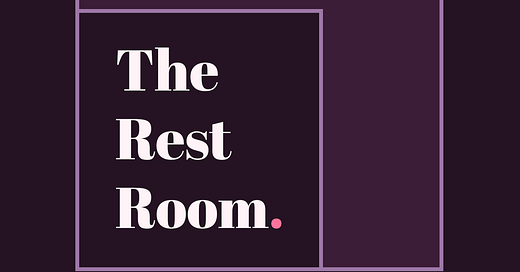Happy Tuesday, everyone.
Before we dig in to today’s issue (which is all about navigating relationships and chronic illness), I just wanted to take a moment to welcome new subscribers, and thank those of you who have been around for a while.
Hi and welcome and thank you!
Last week, I was absolutely delighted to have been featured by Substack in their What To Read series and to have the opportunity to share a bit about what I’m doing here at The Rest Room.
Having my work recognised by Substack and all the kind messages I’ve received over the last few months has been a truly fulfilling and wonderful experience. My doctor recently told me that I need to take some time to convalesce, and whilst I’m trying to figure out what that means for me, one thing I know is that I do not want to stop being here.
When I joined Substack, I did it for two reasons. Firstly (and if I’m being honest) I was having a bit of a tantrum about Instagram. I’d wanted to get off of social media for years, but wasn’t sure how. Secondly (and most importantly) I wanted to be able to write in-depth content and take the time to explore, learn and reflect, away from the demands of feeding an increasingly demanding algorithm.
But beyond Instagram, my purpose here is deeper.
A diagnosis is supposed to open up doors to treatment and support, but for so many people that simply isn’t the case. Through my work as a BBC journalist, health writer and consultant, I’ve had access to some amazing experts and have worked with and advised companies and medical professionals around the world on how to translate medical advice to patients.
There’s so much simple advice that most patients do not receive that could help them better understand their health, their body, and how to safely and sustainably find ways of living with often challenging and debilitating conditions. I didn’t really get it when I needed it, and when I finally did, it changed my life.
In a comment on one of our discussion threads, a lovely reader said that: “You have created something valuable in that space between what is said/not said at a doctor's clinic and how life happens,” and I think that really sums up exactly what I’m trying to do here.
That’s why I love working with experts to create resources on topics like pacing for people who would rather be doing other things and an exploration of what actually is brain fog, as well as wider discussions of issues relating to the care and treatment of chronic illnesses.
Things like why we need to rethink what we mean when we’re talking about recovery, and the problem with how “self-management” is currently thought about in the NHS.
I’ve also shared personal essays about my own experiences living with chronic illness, like how I’m learning (over many years) to not be so scared of my own body, and the fear of disappointment and the pain that comes alongside the hope of new treatment.
I’m still trying to figure out how to balance all the things I want to make and do with a bit of a strange time with my health. I’ve been thinking a lot about what I want The Rest Room to be, how I can play a role in supporting our community, and how to create a little digital space that I know I would have benefited from when I was first diagnosed and scared at 21.
I have a never-ending list of people I want to interview, resources I want to create and things I want to explore, but I’d love to hear from you.
What do you feel is missing in the chronic illness space? What would kind of resources do you need? What kind of topics would you like me to write about?
If you haven’t already, please feel free to introduce yourself in our community thread - we’ve been having some great conversations and there are so many friendly, creative and talented people there. It’s honestly been one of the nicest internet spaces I’ve been in in a long time, and I’m looking forward to our September chat, which will be on Monday 5th September.
And now the slightly awkward part. If you’ve got anything out of my work here on Substack, or over the years with my blog and Instagram (and you’re in a position to) please do consider becoming a paid subscriber to The Rest Room.
You’ll get access to exclusive content, the full archive, the ability to comment on posts (and more, as we grow. I’m going to start going back to record audio for all the archived essays, for example). You’ll also be supporting my work as a writer and enabling me to spend more time creating resources for our community. Thank you.
Ok, enough with all of that. On to today’s episode!
I’ve spent a fair amount of time over the last year writing about how treatment for chronic illness so often neglects the fact that it can impact every single aspect of our lives. If the medications don’t work (and we’re not given the right tools and support) we’re often left feeling abandoned and alone, dealing with the consequences of a life that feels like it has been blown up from the inside.
One of the most frequent topics I’ve been asked on Instagram over the years has been how to navigate relationships of all kinds: romantic, familial, friendship, medical, employer.
Whether we like it or not, chronic illness changes us, and changes the way we interact with the people around us.
And since we just got married, I thought that this would be the perfect time to sit down with Sebastian and reflect on what it’s been like dating with a chronic illness - from both his perspective and mine.
As you’ll hear in this episode, there was a time in my life where as much as I wanted a relationship, I didn’t think that it would really be an option for me. I didn’t even want to be with myself, so how could I expect someone else to want to be with me?
But it turns out I was wrong. I learned to accept that I am worthy of love and can be in a happy and healthy relationship. I learned that my conditions are just a part of me and they’re not going anywhere. and I learned that even if I can’t do a lot of the things healthy young people are “supposed” to do, it doesn’t mean that I don’t have a huge amount to offer in a relationship.
And from Sebastian’s side, we explore what it’s like to be with someone who can’t do a lot of those things. To see someone you love in pain and not be able to stop it. To navigate the emotions and fear and the “burden question”. And, most importantly, how you find joy, humour and happiness, even in the most challenging times.
Obviously, we can only talk about our personal experiences, and we’re not claiming that we have the answers, or that our experiences will be universal. This is just a little snippet of insight into one experience of navigating a relationship with chronic illness.
But if you’re in a place where you’re feeling as though a relationship is out of the question for you, you’re just starting out in a new relationship and wondering how to navigate all the tricky parts, or you’re the partner of someone with chronic illness, we both hope that you find this chat helpful and hopeful.
To listen, you can just click play at the top of this email, or you can listen on Apple, Spotify, Amazon, Google and in the Substack App. If you’d rather read the transcript of the episode, I’ve made that available on my blog.
A big thanks to my friends at Phlo for supporting this episode. They’re the online pharmacy that makes ordering your medication easy. Visit wearephlo.com or download Phlo on your favourite App Store to manage, track, and have your medication delivered at the touch of a button.
Thanks to my brilliant producer Philly Guillou at OG Podcasts, to Lucy Dove for the episode art, and to Amit Rai for my intro music.















Share this post